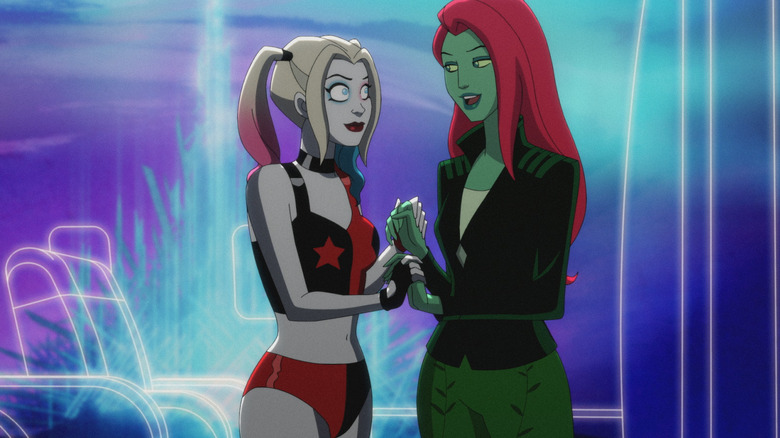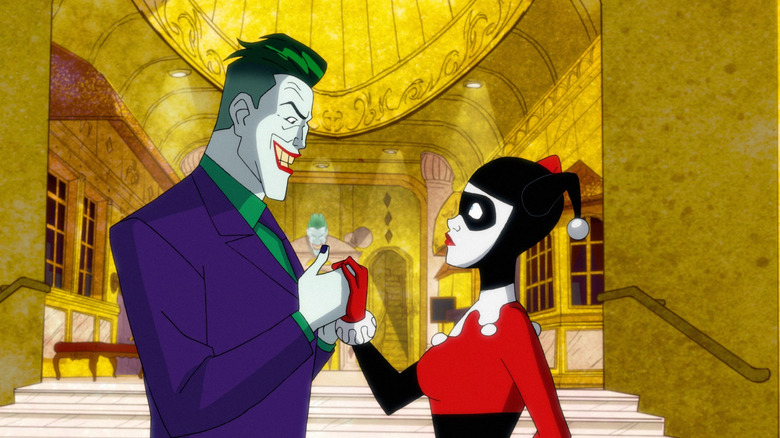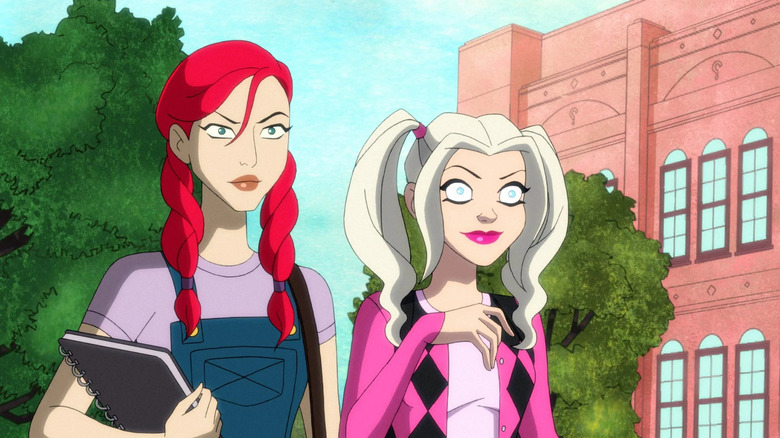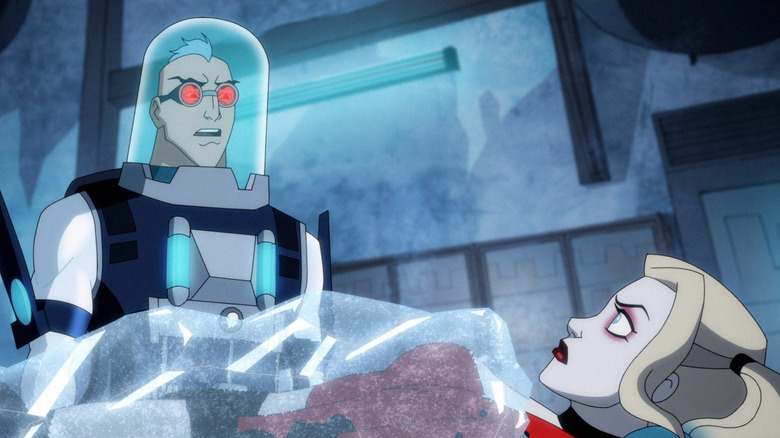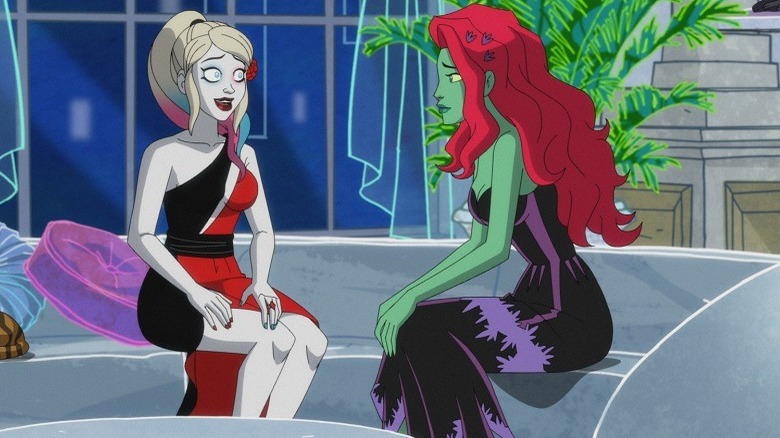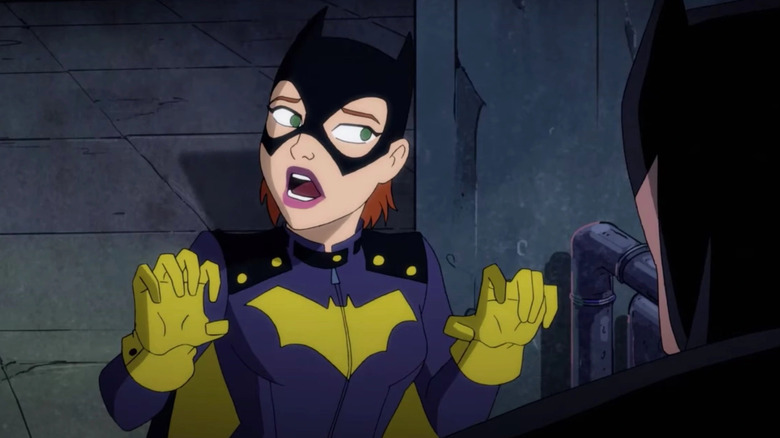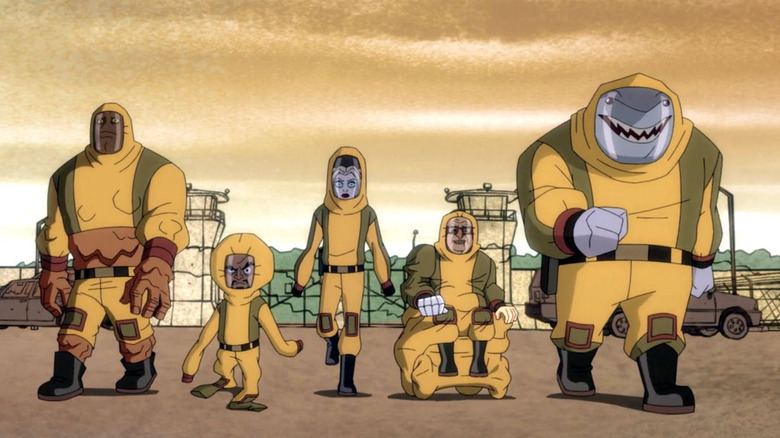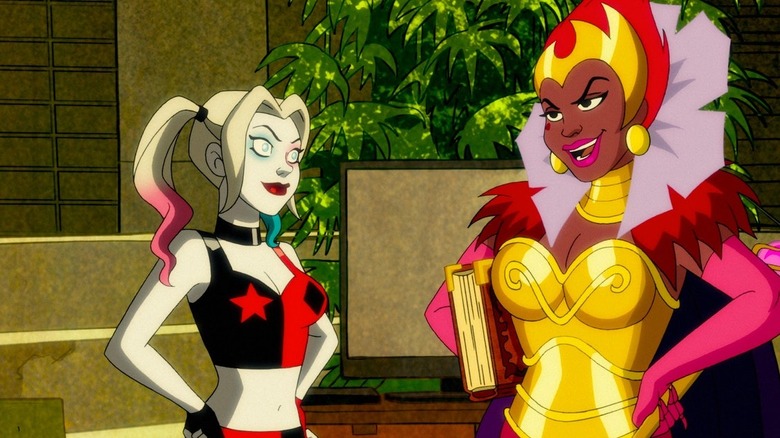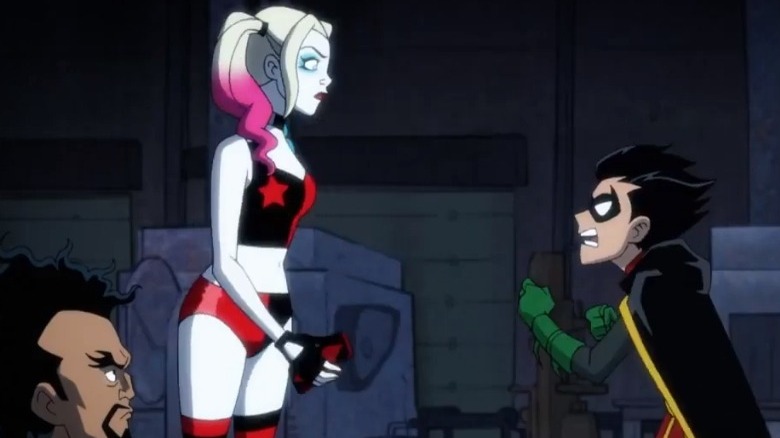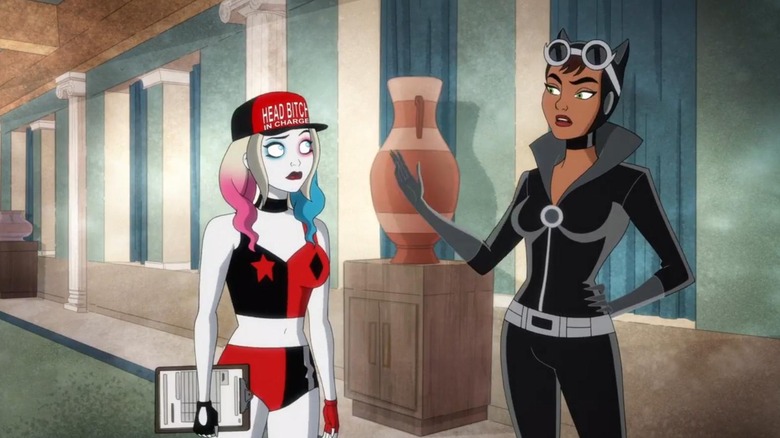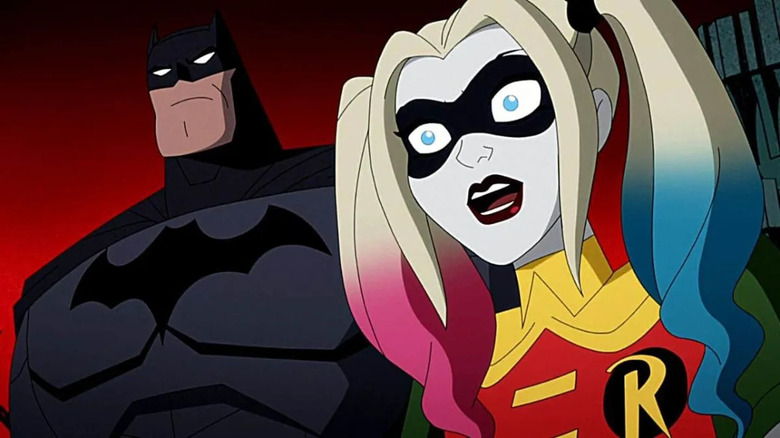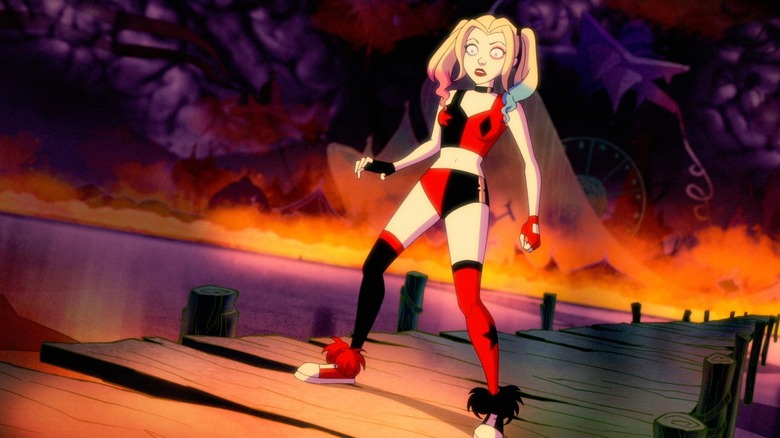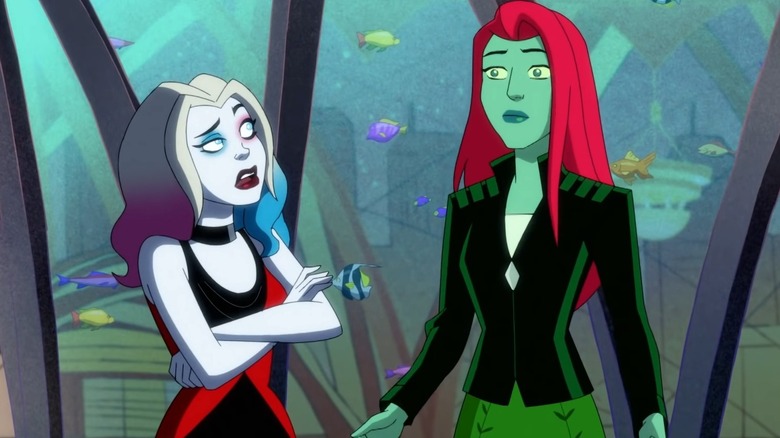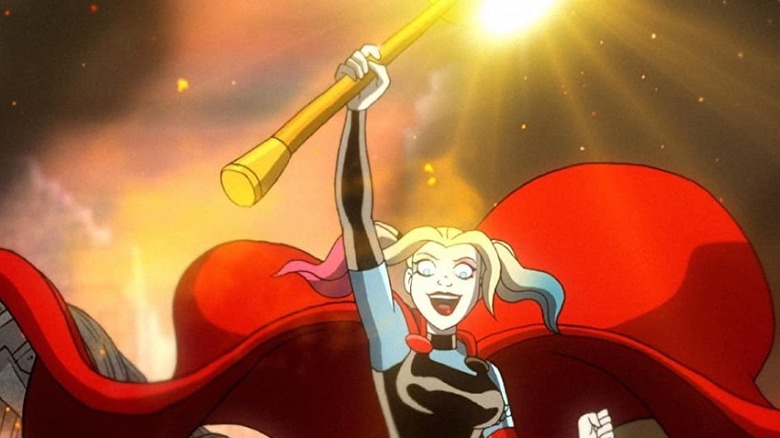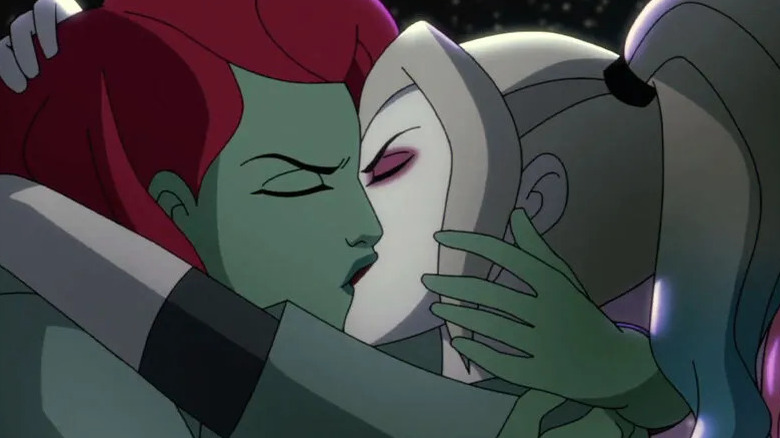14 Best Harley Quinn Episodes Ranked
We may receive a commission on purchases made from links.
The Arkham Asylum psychiatrist-turned-henchwoman Harley Quinn has undergone a rich evolution across cartoons, movies, and comics. Bat-smashing her way through adversaries, Harley Quinn is ripe for enthralling chaos. Since her breakout debut in the "Batman: The Animated Series," which spawned her a fanbase and spin-offs, Harley Quinn has ascended to the star of her own television show.
The R-rated "Harley Quinn" animated series follows Harley (Kaley Cuoco) shedding the suffocations of being Joker's (Alan Tudyk) girlfriend. She falls in love with the plant-controlling Poison Ivy (Lake Bell) and forms a new gang. They wreak havoc across Gotham City, mingling with DC villains and heroes. Throughout the series, the DC Universe characters parody themselves while keeping their essence and comic book lore intact. The show's world-building is founded on the humorous idiosyncrasies of villain life and poking fun at the DC Universe's mythos. Here, /Film ranks the best episodes of "Harley Quinn" so far.
14. The Final Joke
In the electrifying season 1 finale of "Harley Quinn," Joker dominates Gotham — turning the city into a wasteland of terror. Harley has lost her precious Ivy. The only thing left for Harley is to confront the Joker as an act of revenge. Harley has come quite far in her journey of self-discovery, so it's a satisfying payoff when she returns to that vat of acid. But this time, she enacts a different outcome — one she rehearsed in her mindscape in "Being Harley Quinn." Now it's Harley's turn to push her toxic ex into the acid.
Overall, this episode is a triumph and an affirmation of Harley taking control of her story. As a resurrected Ivy says, they're not in a Disney movie. But Harley has worked for a happy ending with supportive friendship. Also, the apocalyptic Gotham without its Justice League promises rollicking territory in the later seasons.
13. Riddler U
College life is no breeze. In "Riddler U," Harley, Ivy, and Clayface (Alan Tudyk) infiltrate a college hijacked by the Riddler. This episode showcases a neat origin story for a really geeky Batgirl (Briana Cuoco) and Harley's fraught "friendship" with her. To its credit, "Riddler U" has many laugh-out-loud moments with lines like: "Bring back the useful degree... art history!" With his new disguise, Clayface gets to flex his acting career highlight: the dramatic Chad-obsessed Stephanie. Anyone who has walked on a college campus will understand all the quippy dialogue. The college gags are plenty, and Harley and Ivy bear the most unsubtle college disguises. Still, Clayface steals the spotlight here.
Unlike most DC heroes, Babs is cordial (though still confrontational when needed) with Harley. This episode shines a light on Quinn's growing friendship with the budding superhero Barbara Gordon, which later evolves into a meaningful alliance throughout season 2 and season 3 of "Harley Quinn."
12. Thawing Hearts
Harley's breakup with the Joker didn't leave her wanting a new romance. Her relationship traumatized her, leaving her less perceptive of what true love is. "Thawing Hearts" sows the crucial seeds for Harley to romance Ivy — even though it would be three more episodes before they have their spur-of-the-moment kiss. And that epiphany occurs after the most awkward hostage dinner ever! — with Mr. Freeze ( Alfred Molina) , who situates his ice-frozen terminally ill Nora ( Rachel Dratch) at the dinner table. Understandably, Harley assumes the worst and seeks to "liberate" Nora from the ice block. Of course, this explodes into the darkly comic audacity of Harley nearly shattering some poor husband's dream (bear in mind that Mr. Freeze is one of the DC Universe's most tragic antagonists) to save his wife.
When Harley witnesses true love's sacrifice, it helps inspire one of the sweetest rescue scenes later in the episode.
11. The Horse and the Sparrow
Watching Harley and Ivy commit crimes and support each other is irresistible. Yet, all the relative healthiness of their relationship came with an ironic consequence: They became better people, but they don't know how to digest that. The season 3 finale of "Harley Quinn" makes massive shifts to unravel the seasonal status quo: Bruce Wayne accepts arrest, and Ivy decides Harley needs to experiment with do-gooding. Despite their villainy, Harley has become an empathic and loyal person. Perhaps what she and Ivy both missed is that their healthy romance molded Harley into a more moral person, and by extension, Ivy has become Harley's moral anchor.
If there's any constructive criticism of season 3, it's Ivy's upward climb to the zombie apocalypse villainy. Overall, it lacked a narrative spine — especially when compared to Harley Quinn's experimenting with being a hero (or anti-hero). It does feel that the "Horse and the Sparrow" could promise a rebound next season as Harley explores heroism. Now, this doesn't mean the show is ready to excise Harley's chaoticness since she spells out that she doesn't know yet if she's into heroism. But it does promise more soul-searching for everyone in "Harley Quinn" season 4.
10. Batman's Back, Man
Perhaps it's counterintuitive to slot a non-Harley Quinn-focused episode in this list. Yes, Harley Quinn's absence is addressed at the top of the episode with a hilariously meta-conversation between two bantering fanboys. But "Batman's Back, Man" has irresistible heart. The episode explores Bruce Wayne's (Diedrich Bader) chosen Bat-family, illustrating his paternal connection to Alfred and his self-esteem issues. Having been a long-time protector of Gotham and shouldering the responsibility of protecting the city alone since the Justice League's exile, he's understandably standoffish with a new hero wearing the Bat-suit. If his symbol is tainted, Gotham could lose faith in him. "Batman's Back, Man" focuses on Bruce learning to trust other heroes, namely the eager and plucky Batgirl.
As Harley learns about the highs and lows of relationships, so does Batman. Alfred's didacticism is a sincere one: Batman must humble himself, take a break, and trust in other good people to do the heroism for him. The brooding Dark Knight has come far enough. While this may be the Harley Quinn show, it's deilghtful to watch a silly batman — one who sneaks out of the house like a rebellious teenager to escape Alfred's disapproving eye.
9. Harley Quinn Highway
"Harley Quinn" enjoys exploiting the chaotic and colorful choices of its titular heroine. Case in point, the episode's titular set piece: The Harley Quinn highway, courtesy of Gotham's tax money. That infrastructural absurdity fits perfectly with the self-obsessed Harley Quinn we know. Some of season 1's most memorable highlights appear in this episode — including a break-in ruse involving pretzel-wrapped weiners and dim-witted henchmen immediately going gaga for phallic-shaped sausages.
But those comic gags aren't as important as seeing Harley mend her relationship with Ivy — especially after all their communication and commitment mishaps! A crucial journey to Ivy's mindscape pushes Harley to confront some uncomfortable truths. The "Being Harley Quinn" episode allowed Harvey to see she's an imperfect survivor. In "Harley Quinn Highway," Harley sees herself as a villain figure in her bestie's brain, leading her to gain humility. The comedy and relationship conflicts in "Harley Quinn Highway" are stuffy and filling as... pretzels-wrapped weiners.
8. The Line
"The Line" illuminates which lines Harley will or won't cross as a villain. She made it clear in "Finding Mr. Right" that she has no interest in murdering innocents to achieve her mission. But "The Line" challenges this commitment by positioning her next to her foil, the Queen of Fables (voiced by a hilarious Wanda Sykes), who is definitely ok with mass murder. She scolds Harley's team with endlessly quotable advice like: "You end the bloodline!"
Aside from showcasing the Queen of Fables' funny storybook minions, the episode gives Harley an adversary who tests her patience and villainy. Harley's inability to accept the Queen of Fables' murderous ways ends up paying off in the most inconvenient way possible — in a spoof mutant origin story. It's a testament to Harley's character that she can risk it all to let her former friend walk away free. Yes, the Queen of Fables makes good on her promise that she will have revenge. But for this moment, it's worth it to Harley to cling to her moral compass the best she can.
7. Finding Mr. Right
After her traumatic breakup with the Joker, Harley Quinn is not someone who can easily form new functional relationships — especially if it's with a hero.
"Finding Mr. Right" contains some of the most priceless utilizations of DC Universe's heroes and villains. Harley's search to be a self-made villain overflows with comedy gold. The DC Universe's serious tone becomes twisted into a world of celebrity pragmatism. Villainy becomes a game of ratings and social media traction. Since superhero narratives thrive on the mythic relationships between two formidable opponents like Batman and Joker, Harley hopes to snag an adversary. However, her ambition to secure Batman as her nemesis leads her to confront 12-year-old Robin (with a cheek-pinching pipsqueak performance by Jacob Tremblay). In this world, Robin is a child actor diva. She may detest it, but you gotta admit, they do make a priceless enemyship.
Framed around a salacious talk show, Harley's square-off in the public eye goes horribly wrong. Harley and Robin's fight turns into a bloodbath of laughs.
6. Bachelorette
Steamy tension is always delicious. In "Bachelorette," Harley's hope to decompress with planning a party for Ivy. However, Ivy's bachelorette party ends with Harley having sex with her. When Harley messes up, she's going to overcompensate. For Ivy's bachelorette party, Harley schemes up a grand excursion to the villain-hijacked island of Themyscira. She reasons that if she can't have Ivy, she wants her to be happy.
There's nothing like getting drunk on girls' night shenanigans. But Harley is having a hard time being happy, and she and Ivy cannot keep their hands off each other. Amid all the comedic escapades, it's a boiling pot of delicious sexual tension between Harley and Ivy. In the end, Harley comes up with a tempting proposition: their romance can bring them everyday happiness. It's a milestone for Harley's maturity. As much as the show makes us root for the union of Harley and Ivy, the writing generously provides empathy for Ivy's reservations about romantically connecting with the always-in-flux Harley.
King Shark also has a compelling arc around marriage and love. His father wants to arrange a marriage for his son's reign. King Shark returns home amidst an Alan Menken-inspired "Under the Sea" number about fish pooping. We cheer for King Shark when he tells off his royal father — if we're still not chuckling about the musical number.
5. Batman Begins Forever
Treading familiar territory — like Batman's origin story — can be a pandering pitfall. But "Harley Quinn" puts a unique spin on this in "Batman Begins Forever." Harley and the gang enter the angsty brain of Bruce Wayne to extract information about his kidnapping of Frank (J.B. Smoove). There, they experience his origin story in a vicious loop. It's up to Harley's psychiatry skills and empathy to get Bruce to open up.
Bruce Wayne's angst over his dead parents has been the butt of jokes across media. Yes, this episode can't resist tweaking those scenes into black comedy. Still, it finds an emotional anchor in the traumatic loop: The repeated and fatal gunshots play like nightmarish drumbeats. Bruce's trauma isn't a repressive "hidden-in-the-corner" take as we witnessed in Harley's and Ivy's minds. It's a loop at the forefront of his mind, shaping his brooding demeanor. We meet facets of Bruce's mind: the young boy who still blames himself for his parent's death and the hardened lonely adult that sprouted from the guilt-ridden mind.
The episode explores an accurate depiction of trauma, showing Bruce's brain relentlessly looping frightening thoughts and images. The interaction between Harley and the young Bruce Wayne brings some welcomed warmth to the series.
If you or someone you know needs help with mental health, please contact the Crisis Text Line by texting HOME to 741741, call the National Alliance on Mental Illness helpline at 1-800-950-NAMI (6264), or visit the National Institute of Mental Health website.
4. Being Harley Quinn
Harley Quinn enters into a coma after being asked: "What's your origin story?" So, Dr. Psycho (Tony Hale) takes the gang into Harley's brain to revive her in "Being Harley Quinn."
Mindscape episodes are perfect for dissecting characters' psychology with plenty of fun potential. Naturally, Harley's Museum of Memories is a carnival, complete with her vicious 10-year-old selves. No victim is a "perfect victim," Harley mentions. We're just as shocked as she is when she sees for herself that the Joker didn't push her down the vat of toxins. It's a sad reminder of how the Joker corrupted her psychology due to their unhealthy relationship with flawed power dynamics. Luckily, Harley doesn't end her mind odyssey by denying what's happened, but by letting herself imagine ways to conquer the memory. The epiphany she gains here will later come into play when she gets revenge against the Joker by restoring his agency too.
Since hacking into Harley's mind requires the gang to be unconscious, there's a rib-cracking B-Story that ratchets up the episode's stakes: Sy Borgman almost cremates their presumably dead bodies.
If you or someone you know needs help with mental health, please contact the Crisis Text Line by texting HOME to 741741, call the National Alliance on Mental Illness helpline at 1-800-950-NAMI (6264), or visit the National Institute of Mental Health website.
3. L.O.D.R.S.V.P.
In "L.O.D.R.S.V.P.," Ivy brings up a solid question: Can Harley find validation in such a male-dominated villain institution like the Legion of Doom? Ivy tries to support Harley's wishes to mingle with an institution that doesn't care about them. When the Legion of Doom selects Harley as a candidate, Ivy is skeptical of their motives. Her instincts are correct: Lex Luther is after Harley. Believing in Harley's dream clashes with Ivy's desire to protect her, causing their friendship to fray.
Poison Ivy's protectiveness over Harley Quinn is humanizing and heartwarming, but it also doubles down with the episode's folly. Despite Ivy wanting to keep Harley safe, she cannot be honest with Harley. She can't communicate her suspicions to Harley for fear of spoiling her good mood. Part of it is that Ivy has to accept that Harley is her person with her interests. This miscommunication culminates with Harley handling the situation messily. Props to season 1 for showing a relationship issue can take multiple episodes to fix.
In line with the theme of needing to communicate, Sy also reconciles with his bestial sister after decades of estrangement. "L.O.D.R.S.V.P" makes a case for speaking honestly with your loved ones, even if it takes decades and a mutation mishap to get there.
2. Inner (Para) Demons
Harley Quinn is intensely relatable. She's the funhouse mirror of humanity, illuminating our worst and extreme impulses. We follow her because she's a short fuse and often acts out those inappropriate impulses we can't. So of course we root for her when she overcomes the worst aspects of herself.
After her first kiss with the already-betrothed Ivy, Harley Quinn acts out poorly. She decides to experiment with more atrocious actions, namely world dominion. At Doctor Psycho's advice, she swears fealty to Darkseid to gain his demonic army. When Darkseid senses you're misbehaving to distract you from dealing with a problem, that's never a good sign! Including a badass showdown with Granny Goodness (Jessica Walter), "Inner Para-demons" finds the wicked fun in Harley Quinn's downward spiral as she ascends to god-tier villainy. While it's a good thing Ivy reminds Harley of her moral compass, Harley is only a tad closer to being more honest about her feelings — almost.
1. There's No Place to Go But Down
A hulking guy pining for validation, Bane (James Adomian) is the top contender for the funniest villain of "Harley Quinn." In "There's No Place to Go But Down," Bane's pit prison — rife with rehabilitation art programs — is full of humor. Bane scolds his prisoners for messy beds and warns Ivy about the high stakes of doing stand-up comedy after George Lopez. Little did he know that his pit also is the center stage for Harley and Quinn's romantic relationship. Their "will they, won't they" chemistry has been blossoming into one of the greatest animated queer romances. Their climactic kiss crackles and pops like an unexpected firecracker amidst the laugh-out-loud moments.
Harley has come so far. She once threw herself in a pit for the Joker. Now, Harley will fall for a beloved who will pull her up. Harley will believe in Ivy so hard that it could shatter the Earth — or embolden Ivy to overcome her stage fright and incite a prison riot through stand-up comedy, which she hilariously does too.
